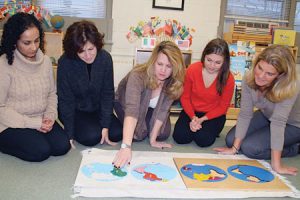MCTD Early Childhood Course Descriptions
Summer Session
Child Development
Analyze the basic theories and stages of child development as outlined in the works of major child development theorists. Coursework will highlight the physical, cognitive, emotional, and social development of children. Current research on child development will be presented by guest lecturers.
Montessori Philosophy
Participate in a series of lectures, discussions, and media experiences about the historical perspectives and key components of the Montessori Method through Maria Montessori’s own writings.
Practical Life
Study the philosophy and rationale of Practical Life. Adult Learners will broaden their understanding of the control of movement, care of self, care of the environment, food and nutrition, grace and courtesy, and ground rules.
Sensorial
Discover the uses of the Sensorial materials and strengthen your understanding of both the education and refinement of the senses in children. Topics of study will
Academic Year
Math
Examine the fascinating Montessori Math materials which focus on the development of the child’s mathematical mind. Adult Learners will be introduced to the concepts of numeration, linear counting, the decimal system, the four basic operations in math, fractions, and memorization of basic arithmetic facts.
Language
Identify the developmental needs of the young child within the scope and sequence of the Montessori Language materials. Topics include receptive and expressive language, visual and auditory perception training, vocabulary development, pre-reading activities, reading, writing, functions of words, children’s literature, and drama. Guest lecturers and hands-on practice will be offered in specific areas.
Cultural Subjects
Social Studies
Explore the many ways children can learn about the world’s cultural diversity and physical geography, including world and personal history, land and water forms, maps and globes, and much more.
Physical and Life Science
Learn the philosophy and rationale of science in the Montessori curriculum. Adult learners will study botany, zoology, earth elements, and physical science.
Art
Accumulate wonderful ideas and techniques for preparing a classroom art environment for 2½ to 6-year-olds. Techniques and resources presented are intended to entice and inspire the Montessori teacher to nurture artistic creation, exploration, and appreciation.
Music/Movement
Understand what is most important to children ages 2½ to 6 in music and movement, regardless of previous experience. Tools for engaging young children in this important area of self-expression will be shared throughout the course. Areas covered include: philosophy, singing, rhythmic skills, music appreciation, body awareness, locomotor skills, stationary and line activities, and the importance of movement in the classroom
Student Teaching Seminars (STS)
STS directly support the Adult Learner’s role as a Montessori Intern with regard to classroom management, curriculum, ongoing observation, and professional behavior.
Classroom Leadership/Management
Acquire
Parent Involvement
Examine the parent-teacher-child relationship and the importance of mutual trust, respect, and communication. Adult Learners will reflect on how they were parented and how to create a partnership that will assist in the development of a successful parent-child relationship. Through role-play and dialogue, the Instructor will present various models for parent interactions, including parent meetings, telephone calls, and how to conduct successful parent-teacher conferences.
Administration
Obtain an overview of licensing requirements for school programs, day-to-day administrative issues,
Observation
Develop the necessary skills to utilize direct observation as a primary tool for studying children and as an aid in developing teaching strategies tailored to individual needs and classroom dynamics. Obtain an understanding of Dr. Montessori’s philosophy of observation and learn the difference between objective observation techniques and the narrative style of reporting. Adult Learners will be provided the framework for observation and reflection that promotes connections between theory and practice. Observations in Montessori settings using a variety of techniques will be expected.

